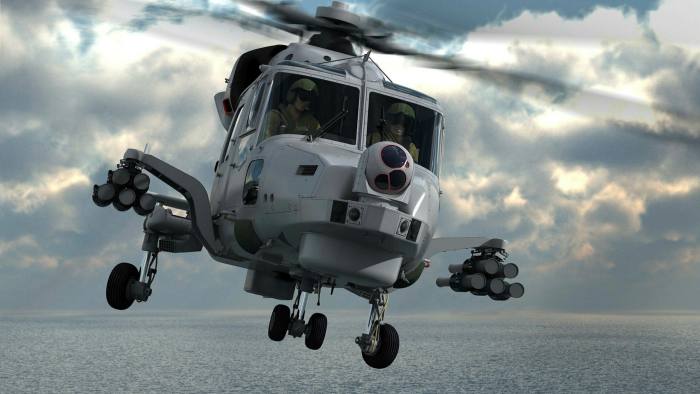
Virus obstructs US and UK bids for $800m South Korea helicopter deal
Travel restrictions and spending cuts muddy defence sector outlook
by Edward White, Song Jung-aSweeping global travel restrictions have hindered the awarding of an $800m marine helicopter contract being fought over by UK and US manufacturers, in the latest example of the coronavirus pandemic disrupting the defence sector.
US-based Lockheed Martin and Italian defence group Leonardo are competing to supply the South Korean navy with 12 anti-submarine helicopters as well as weapons systems and support services.
But plans by South Korean military officials to visit both companies to conduct testing have been scuppered by months of delays owing to restrictions that include weeks-long coronavirus quarantine requirements, according to several people familiar with the matter.
Both Lockheed Martin and Leonardo declined to comment on the situation.
When it comes to exporting and importing major weapons and defence equipment, experts have to be dispatched for tests before signing a dealShin In-kyun, Korea Defense Network
The Defense Acquisition Program Administration, the South Korean agency handling the tender, said negotiations were continuing. It did not comment further.
The hold-ups are the latest in a series of complications for the contract, which has been marred by concerns over transparency and fairness as President Donald Trump pressures allies to contribute more to defence costs.
Shin In-kyun, the head of Korea Defense Network, a Seoul think-tank, said the “unprecedented health crisis worldwide” was having a broad impact on the defence industry.
“When it comes to exporting and importing major weapons and defence equipment, experts have to be dispatched for tests before signing a deal. Unless they get exceptional treatment regarding travel restrictions and quarantine, these international deals are likely to be delayed,” Mr Shin said.
Leonardo, which makes AgustaWestland Wildcat helicopters at Yeovil in south-west England and is the incumbent supplier for marine helicopters to the South Korean navy, was the only company to submit a proposal following an initial round of bidding in 2018.
However, DAPA is also considering a rival bid from Lockheed Martin after the US company joined the bidding process last year. The Maryland-headquartered group wants to sell its MH-60R Seahawk, commonly referred to as the “Romeo” — the same helicopters India purchased this month in a $900m deal.
Experts said the contract delay underscored broader uncertainty as defence companies face problems caused not only disruptions from travel restrictions and lockdowns, but also smaller defence budgets as governments are forced to reallocate funding for virus response efforts.
John Dowdy, a McKinsey partner, wrote this month that while defence manufacturers were so far “largely unscathed” while weathering disruptions, tough spending cuts loomed.
“Defence spending is driven by annual budget cycles rather than daily load factor, so changes can take longer to manifest. As we enter a new fiscal year, defence manufacturers could face big headwinds,” he said.
Editor’s note

The Financial Times is making coronavirus coverage free to read to help everyone stay informed. Find the latest here.
South Korea has signalled plans to trim its defence budget for 2020 by about Won900bn ($725m) as it deploys $200bn in virus-related spending. Analysts reckon that further cuts may be required if the global economic downturn persists.
“It is unavoidable that governments divert defence spending to shore up the economy and boost welfare spending in these times . . . The [South Korean] government is likely to adjust its midterm defence spending plans, delaying purchases of major weapons by a year or two,” said Yang Wook, a senior researcher at the Korea Defense and Security Forum, a think-tank.
Additional reporting by Kang Buseong in Seoul